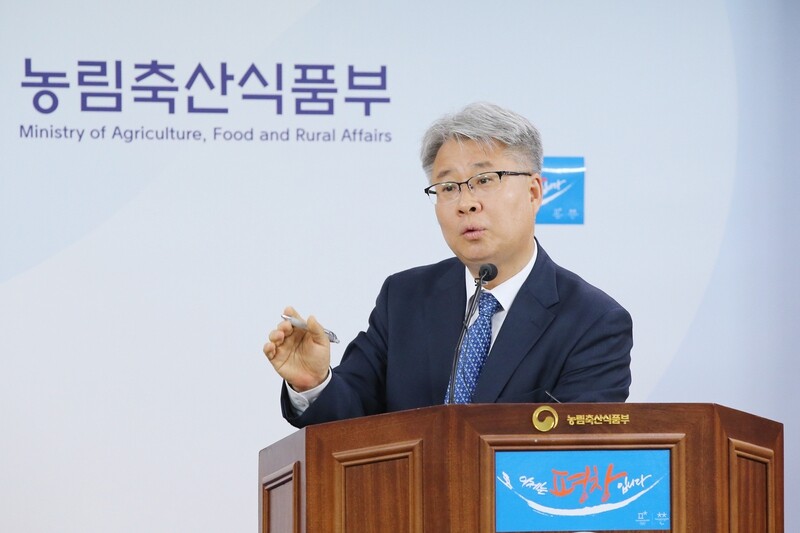hankyoreh
Links to other country sites 다른 나라 사이트 링크
Unapproved seeds found growing throughout South Korea

Large amounts of unapproved Chinese living modified organism (LMO) rapeseed are being farmed throughout South Korea, an investigation found. The government is now taking action to address the holes revealed in the current imported seed inspection system.
In a briefing at the Sejong Government Complex on June 7, the Ministry of Agriculture, Food and Rural Affairs (MAFRA) announced that an investigation tracing all Chinese rapeseed seeds imported since Jan. 2016 showed 32.5 tons imported by four companies - amounting to 40.8% of the 79.6 tons imported by a total of ten companies - to have come into South Korea with LMO seeds mixed in. Much of the quantity is already being raised at 56 farms in South Korea’s 13 provinces and metropolitan cities.
MAFRA announced that it had incinerated 14.2 tons that were still being held, while another 12.1 tons had been discarded and one ton was found to not contain any LMO seeds. The Korea Seed & Variety Service (KSVS) is currently tracing client information for 464kg from small transactions to see if LMO seeds were included. The investigation was carried out after the farming of unapproved Chinese LMO rapeseed was confirmed for the first time on May 15 at the Taebaek Rapeseed Flower Festival in Gangwon Province.
Living modified organisms differ from the genetically modified organisms (GMO) commonly used in food and feed in that they can reproduce and have the potential to disrupt ecosystems. The recently discovered LMO rapeseed belongs to the GT73 variety developed by the US company Monsanto and is characterized by pesticide resistance. When farmed, GT73 is reported to reproduce prolifically through the second generation, but to show a marked decline in reproductive capabilities and die out naturally afterwards.
MAFRA said there was “no need to be very concerned about health or other safety issues, as the strain has not only been approved for wide-scale seed farming in the US, Japan, and Australia, but has also been approved for food and feed use in South Korea.”
At the same time, it explained that it was “taking active measures in consideration of the fact that it has not been approved for seed use in South Korea because there has not yet been an environment impact assessment according to the law.”
The major issue with the discovery is the holes it revealed in the inspection system for imported seeds, which has typically been conducted through sampling. While over 40% of rapeseed seeds imported from China over the past 17 months had LMO seeds mixed in, most went undetected in import inspections. While the LMO seeds were eventually discovered in KSVS monitoring last month, many are already being farmed throughout South Korea’s 13 metropolitan cities and provinces.
The government announced that it would be adopting full screening rather than sampling of Chinese seeds and improving seed inspection methods until the reason for the inclusion of LMO in Chinese rapeseed seeds is ascertained and response measures are formulated.
By Heo Seung, staff reporter
Please direct questions or comments to [english@hani.co.kr]

Editorial・opinion
![[Column] Has Korea, too, crossed the Rubicon on China? [Column] Has Korea, too, crossed the Rubicon on China?](https://flexible.img.hani.co.kr/flexible/normal/500/300/imgdb/original/2024/0419/9317135153409185.jpg) [Column] Has Korea, too, crossed the Rubicon on China?
[Column] Has Korea, too, crossed the Rubicon on China?![[Correspondent’s column] In Japan’s alliance with US, echoes of its past alliances with UK [Correspondent’s column] In Japan’s alliance with US, echoes of its past alliances with UK](https://flexible.img.hani.co.kr/flexible/normal/500/300/imgdb/original/2024/0419/2317135166563519.jpg) [Correspondent’s column] In Japan’s alliance with US, echoes of its past alliances with UK
[Correspondent’s column] In Japan’s alliance with US, echoes of its past alliances with UK- [Editorial] Does Yoon think the Korean public is wrong?
- [Editorial] As it bolsters its alliance with US, Japan must be accountable for past
- [Guest essay] Amending the Constitution is Yoon’s key to leaving office in public’s good graces
- [Editorial] 10 years on, lessons of Sewol tragedy must never be forgotten
- [Column] A death blow to Korea’s prosecutor politics
- [Correspondent’s column] The US and the end of Japanese pacifism
- [Guest essay] How Korea turned its trainee doctors into monsters
- [Guest essay] As someone who helped forge Seoul-Moscow ties, their status today troubles me
Most viewed articles
- 1[Column] The clock is ticking for Korea’s first lady
- 2Hong Se-hwa, voice for tolerance whose memoir of exile touched a chord, dies at 76
- 3After 2 months of delayed, denied medical care, Koreans worry worst may be yet to come
- 4[Column] Has Korea, too, crossed the Rubicon on China?
- 5US overtakes China as Korea’s top export market, prompting trade sanction jitters
- 6Samsung barricades office as unionized workers strike for better conditions
- 7All eyes on Xiaomi after it pulls off EV that Apple couldn’t
- 8[Correspondent’s column] In Japan’s alliance with US, echoes of its past alliances with UK
- 975% of younger S. Koreans want to leave country
- 10[Correspondent’s column] The US and the end of Japanese pacifism